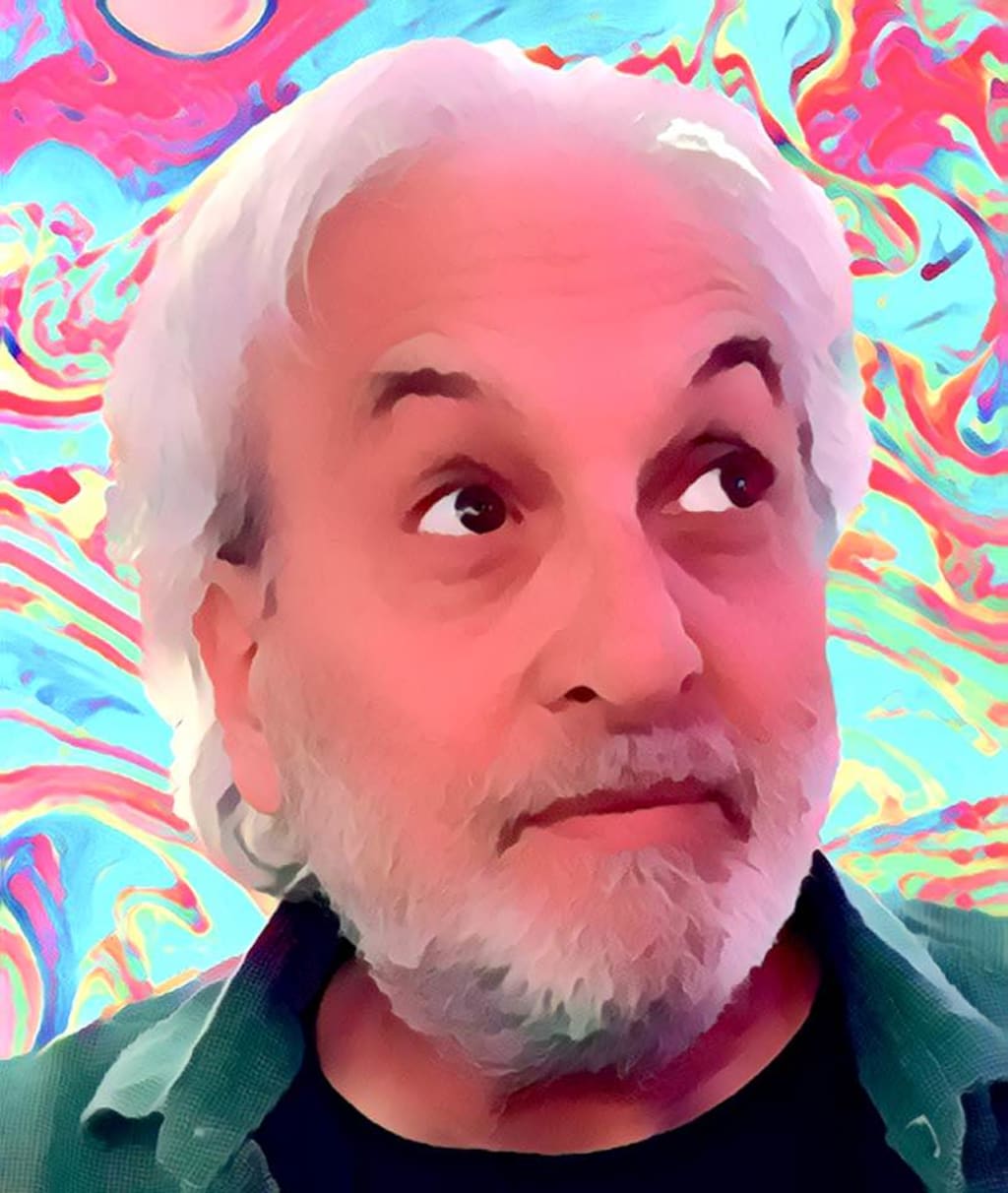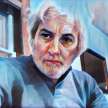The Steve Derry Decade
The 60s were never like this

THE STEVE DERRY DECADE
London-July 1963
There is something in the air here this summer. With Cuba, Profumo and Cliff Richard safely behind them, Londoners have a bounce in their step that had been missing since Britannia ruled the waves.
This past year has seen a flurry of activity around England, especially in the world of popular music. From the North Country came the Beatles, who showed so much promise with their first two hit singles, "Please, Please Me" and "From Me To You." Strangely though, their next 45, "She Loves You", performed poorly on the charts, while a new band from Kingston-on-Thames, the Steve Derry Six, captured the imagination of the world with their brand of quirky, sophisticated pop/rock that was hard to dislike. Their second single, "Happy To Be Happy", broke all previous sales records in the UK. More importantly, they were the first British artist to 'cross the pond', as "Happy" shot to number one in America, then the world. Their label in the states, small independent Bingo Records, put all its promotional force behind the group, hailing the 'Surrey Sound' as the wave of the future for popular music. Many groups tried to imitate the 'slick six', as the flacks referred to them, but the public was having none of it, though for a time Derry sound-alikes were filling many of the chart positions right behind the originators.
_________________
By that winter, Steve and the Six were undisputed kings of the entertainment world. They passed up the chance to play for the "royals" at a 'Command Performance', instead putting on a free concert in Hyde Park the same evening. A smashing success, the concert drew 5 million fans.
In America, President Kennedy hailed the band as "what England can do for us." So logically, when the boys arrived at Idlewild Airport in New York on November 23, 1963, Kennedy, along with Jackie, were there to greet them. In a legendary press conference at the airport, Steve told reporters he had nothing witty to say, and besides, they were running late. The group then ran into waiting limos, snubbing the leader of the free world and the first lady.
By the next spring, Steve and the lads had hit the top of the charts an amazing 8 times: "Happy To Be Happy", "Six Of One", "What a Stupid Thing To Say", "That's a Load of Rubbish", "Clever But Alone", "Killing Two Birds (With Fourteen Pounds)", "Slanty-Eyed Chinese Girl", and the anthemic "We All Have One". Their cynical and basically pessimistic take on love and war was a breath of fresh air in a time of disarmament and cock-eyed optimism.
When the Republican Party nominated Barry Goldwater that summer, the Steve Derry Six got behind his campaign with a fervor unprecedented in the annals of teen idol history. Steve himself spoke at the Republican convention, which caused Kennedy to declare the band's music "sick and trivial." Nevertheless, Derry and the bloke's next two singles shot to number one: "If You Don't Like It (You Know What You Can Do)", and the bombastic "Extremism In Defense Of My Heart (Is No Vice)".
Their first feature film debuted on October 22, 1964. Timed to sway undecided voters, "Bombs Away" was a wild romp, in which the boys played leaders of a mythical empire out to wreak vengeance on the president of a powerful nation. A major hit with critics and audiences alike, "Bombs Away" was credited by many pundits for pushing Goldwater over the top. In just a year and a half, these lads from Surrey had become power brokers on the world stage.
All this activity did not sit well with some of the folks back home. "What is that Derry bloke doing over there in bleedin' America, messin' about with their bloody politics?" asked more than one fan, while Prime Minister Home called for an investigation of Derry's background. But the fans remained loyal to their music. Not only had all their releases hit number one on the English charts, but 3 EPs, a recording of their farting sounds, and a ham-and-cheese sandwich all reached the coveted top spot. Clearly, the public couldn't get enough of the Kingston Kids.
The makeup of the "Six" (which were really only five because Steve was counted as two), seemed to change from recording to recording. The original group consisted of Harry Dinwiddie (bass), Clive Grant (organ), Graham Spencer (drums), Dennis Demenez (guitar) and Pierre Dubois (clavichord). However, only Spencer remained with the group by the end of '64. Dinwiddie, Grant and Dubois all died after leaving the band, coincidentally all by the same means -- hit by a train (and, in a further coincidence, within two days of each other, and by the same train, though at different crossings). Demenez went on to star in his own television series, became an alcoholic, and now designs swimwear for amputees outside of Capetown.
Derry and Spencer were joined by crack studio musicians on future recordings. Steve felt it was better that way, because "then no one will get bored or think they have anything to do with it." Most fans were unaware of the changes, as Steve was careful to hire musicians who looked exactly alike.
After appearing on the Ed Sullivan Show for the eighth time in four months, the band took a long-deserved break. This occurred on Thursday, December 3, 1964, between 2:30 pm and 8:16 pm. Then it was back to the studio to record their biggest hit yet, "I'll Pull Your Ears Off If You Say That Again".
Meanwhile, a small but annoying group of naysayers began questioning the propriety of a pop band wielding so much power over a large number of people. Finally, on Christmas Eve, 1964, Derry addressed the nation.
"Hello, nation," he began. "I would like to speak this evening to the small but annoying group of naysayers who question the propriety of…well, you know. While your opinions are entitled to be had by you, I feel you should just shut your bloody gobs. Or else. Because I represent a new generation of young people, people who don't care about world peace or poetry or civil rights. We just want to ingest beer, saccharine and red dye #2, get our hair cut as short as we want, and form an army so that no individual or country can take away any of our material possessions. Oh yeah, and make music. Music that is quirky, sophisticated, and hard to dislike. I'd like to discuss my agenda further, but it's Christmas Eve. So there."
By the dawning of the new year, there was revolution in the air. All over America, coffee houses were closing down as young people, with a new sense of purpose, joined the army in record numbers. Soon, American forces were finishing off the last of the North Vietnamese insurgents, and returning home as heroes. Derry's tribute to the troops, "You Chaps Kicked Arse", was the theme song for a united America in the mid-sixties. Derry was nominated for a cabinet post, Secretary of Entertainment, by President Goldwater, a first for a foreign citizen. Goldwater got around a potentially messy situation by declaring Derry an American citizen on May 5, 1965. "Glad to be done with England," Derry remarked, when pressed for comment.
Now in charge of something really important, Steve quickly moved into action. He met with his Under-Secretary, Graham Spencer (drums), and decided to burn down the Reichstag and invade Poland. Spencer argued that this had nothing to do with entertainment. "One man's entertainment is another man's invasion of Poland," Derry shot back. Unable to reach an agreement, they returned to the studio to record their most ambitious album yet, "Our Most Ambitious Album Yet".
All summer long, everybody kept on playing "OMAAY", as it became known. It was the soundtrack to millions of young lives. "I remember that summer of '67," said Brad Culpepper, a Berkeley student at the time, today a farmer of exotic grains. "The 'summer of disdain', as it became known. The message we wanted to get out there was 'be cautious', 'don't be so quick to like everyone', and 'sex isn't really that great'. And Steve Derry said it all on that album. I remember listening to it at least twice that year."
By this time, no other music could be heard on the airwaves. "All Derry, All The Time" was the slogan of every music station in the nation. Every college in America had an SDS chapter (Steve Derry Six) and just about every student belonged. Except a few creeps.
It was a quiet, peaceful America in those heady years of the late 60's. The band continued to turn out hit after hit ("Jeez, I Only Asked", "There's No Metaphor For You", "Pink On The Inside", "Let's Invade Poland", just to name a few). Two more movies were produced ("Love Is For Silly- Heads" and "Bombs Away 2", both unanimously praised), but by late '68, Derry was hungry for something more challenging. He had changed the world of entertainment, from both without and within, and in so doing, changed the world. But somehow, that wasn't enough.
Derry resigned his cabinet post in November of '68 and began a project that again revolutionized the way the world lived. But its beginnings (like most great ideas) began with an innocuous conjecture.
"What if . . .?" The question all great minds ponder. But this went way beyond a mere ponderence. Because Steve Derry was nothing if not a 'doer'. And do he did.
In the late '60's, America's greatest problem was the small percentage of people who didn't like what was going on. If allowed to continue unchecked, this malcontented few (estimated at the time to be a mere 4% of the population, or only about 8,225,000 people) could make it very unpleasant for the contented many. But what to do? The U.S. had a long history of tolerating dissent, as Derry knew full well. But there was a difference between dissent and disloyalty. This group insisted on espousing ideas such as equality, ecology, and individuality. Many wore bad clothes (often unpressed or poorly coordinated). Most didn't even buy Steve Derry Six records.
Derry had a plan. Why not, he reasoned, kill all of them? But how? He had to get them all in one place, somehow.
Steve announced the Woodshed Weird Music Festival would take place in August of 1969. Set up on a farm in upstate Rhode Island, it would feature artists and musicians relevant to the 'counter-culture'. Advertised as "3 days of whatever it is you people like", Woodshed was a 'must' event for the 4 percent. It drew an incredible 8,225,000 participants (ironically, the largest concert ever, surpassing Derry's Hyde Park show a few years before). Besides cult-faves The Beatles, performers included Joan Baez and Freddie and the Dreamers. At 10:02 pm, as the 8 million-plus fans, sprawled out over the open farmland, rose in unison to "do the Freddie", a squadron of B-52 fighters swept down on the crowd. What followed was the most efficient elimination of undesirables in history. Within a few minutes, America's problems were solved. It was a fitting end to an incredible decade. One can only imagine how it might have turned out if it weren't for the Steve Derry Six.
About the Creator
Sandy McKnight
quite-a writa






Comments
There are no comments for this story
Be the first to respond and start the conversation.